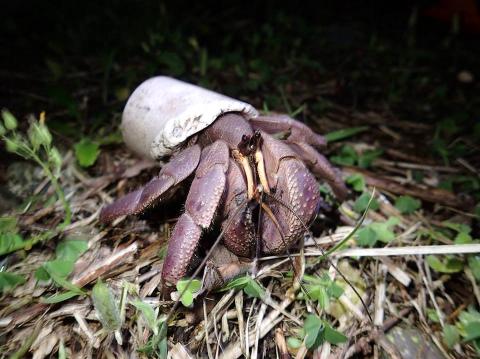Most of the Coenobita brevimanus, a species of land hermit crabs, in the Sansiantai area (三仙台) in Taitung County’s Chenggong Township (成功) are using plastic bottle caps as shells, a Tainan-based marine biologist said on Sunday.
Chiu Yu-wen (邱郁文), a researcher at National Cheng Kung University’s Center for Research in Water Science and Technology, said he last week traveled to the area to conduct research on hermit crabs and discovered that among the 14 Coenobita brevimanus that he encountered, most of them were using plastic bottle caps as shells.
Even the few crabs that had shells were carrying ones that were either damaged or too small to fully protect their bodies, he said.

Photo courtesy of Chiu Yu-wen
The carapace of the Coenobita brevimanus can measure up to 45mm, Chiu said, adding that they are the second-largest species of hermit crabs in Taiwan.
Unlike natural shells, plastic bottle caps and damaged shells do not provide hermit crabs with an effective and confined shelter for defense, Chiu said.
Apart from being unable to effectively defend themselves against predators, hermit crabs that use plastic bottle caps as shells or damaged shells are also unable to prevent water from evaporating from their bodies, let alone reproduce during the breeding season, he said.
Hermit crabs are also unable to steadily hook onto plastic bottle caps using their abdominal appendages due to the smooth liner inside the caps, he added.
Chiu said that part of the problem is that when edible shellfish are consumed at restaurants, empty shells are not returned to the shores, thereby creating an insufficient supply of shells for hermit crabs.
Hermit crabs on other shores face similar problems, he added.
Due to their proximity to farms and windbreaks, Tainan’s hermit crabs can substitute the shells of shellfish with the shells of the Lissachatina fulica, a species of land snail also known as the giant African snail, Chiu said.
However, because the shells of snails are thin and fragile, they are not ideal, he said.
A short-term solution would be to set up a collection point for shells near the entrance to the Sansiantai area, he said.
However, to maintain the hermit crabs’ habitat — including the environment and the quality of water — and ensure a sustainable management of fishery resources, long-term investment is needed, Chiu said, adding that right now, the most urgent task is to find shells for the crabs.

STAY AWAY: An official said people should avoid disturbing snakes, as most do not actively attack humans, but would react defensively if threatened Taitung County authorities yesterday urged the public to stay vigilant and avoid disturbing snakes in the wild, following five reported snakebite cases in the county so far this year. Taitung County Fire Department secretary Lin Chien-cheng (林建誠) said two of the cases were in Donghe Township (東河) and involved the Taiwan habus, one person was bit by a Chinese pit viper near the South Link Railway and the remaining two were caused by unidentified snakes. He advised residents near fields to be cautious of snakes hiding in shady indoor areas, especially when entering or leaving their homes at night. In case of a

ENERGY RESILIENCE: Although Alaska is open for investments, Taiwan is sourcing its gas from the Middle East, and the sea routes carry risks, Ho Cheng-hui said US government officials’ high-profile reception of a Taiwanese representative at the Alaska Sustainable Energy Conference indicated the emergence of an Indo-Pacific energy resilience alliance, an academic said. Presidential Office Secretary-General Pan Men-an (潘孟安) attended the conference in Alaska on Thursday last week at the invitation of the US government. Pan visited oil and gas facilities with senior US officials, including US Secretary of the Interior Doug Burgum, US Secretary of Energy Chris Wright, Alaska Governor Mike Dunleavy and US Senator Daniel Sullivan. Pan attending the conference on behalf of President William Lai (賴清德) shows a significant elevation in diplomatic representation,

Credit departments of farmers’ and fishers’ associations blocked a total of more than NT$180 million (US$6.01 million) from being lost to scams last year, National Police Agency (NPA) data showed. The Agricultural Finance Agency (AFA) said last week that staff of farmers’ and fishers’ associations’ credit departments are required to implement fraud prevention measures when they serve clients at the counter. They would ask clients about personal financial management activities whenever they suspect there might be a fraud situation, and would immediately report the incident to local authorities, which would send police officers to the site to help, it said. NPA data showed

A magnitude 6.4 earthquake struck off the coast of Hualien County in eastern Taiwan at 7pm yesterday, the Central Weather Administration (CWA) said. The epicenter of the temblor was at sea, about 69.9km south of Hualien County Hall, at a depth of 30.9km, it said. There were no immediate reports of damage resulting from the quake. The earthquake’s intensity, which gauges the actual effect of a temblor, was highest in Taitung County’s Changbin Township (長濱), where it measured 5 on Taiwan’s seven-tier intensity scale. The quake also measured an intensity of 4 in Hualien, Nantou, Chiayi, Yunlin, Changhua and Miaoli counties, as well as